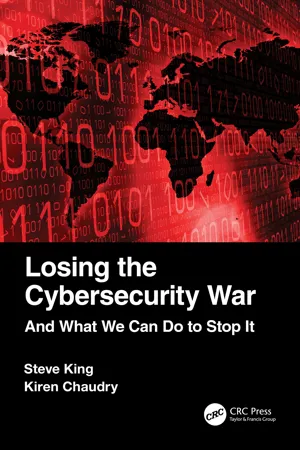
Losing the Cybersecurity War
And What We Can Do to Stop It
- 148 pages
- English
- ePUB (mobile friendly)
- Available on iOS & Android
About This Book
This book explains the five pillars or battlefields of cybersecurity and how a Zero Trust approach can change the advantage on each battlefield. We have taken a deep dive into each of five battlefields where we have a decided disadvantage due to constitutional structure and moral behavioral guidelines, where we provide examples of how we got here, what we can do about it, why we got here, and how we can avoid these traps in the future. This is a unique viewpoint that has never been explored – the five battlefields include Economics, Technology, Information, Education, and Leadership – and how each has contributed to our current disadvantage on the global stage. We go on to discuss how Zero Trust can change the game to create an advantage for us going forward. The credibility of Zero Trust stems directly from the father of Zero Trust, John Kindervag, who says, "And now, Steve has written a new book on Zero Trust called Losing the Cybersecurity War: And What We Can Do to Stop It. It is undeniably the best Zero Trust book yet written. While other writers have focused on implementing Zero Trust from their perspectives, Steve focuses on why Zero Trust is so important on the modern cybersecurity battlefield. His concept of the five cyber battlefields is a great insight that will help us win the cyberwar. By weaving Zero Trust principles throughout these five concepts, Steve demonstrates how the ideas and efforts involved in building Zero Trust environments will lead to a profound shift in terrain advantage. No longer will attackers own the high ground. As defenders and protectors, we can leverage modern technology in a Zero Trust way to keep our data and assets safe from infiltration and exploitation."
Frequently asked questions
Information
Table of contents
- Cover
- Half Title
- Title Page
- Copyright Page
- Contents
- Foreword
- Testimonials
- Preface
- Acknowledgements
- Introduction
- Chapter 1 ■ What Is Zero Trust?
- Chapter 2 ■ The Five Battlefields of Cybersecurity
- Chapter 3 ■ The Impact of the Last 20 Years
- Chapter 4 ■ The Connected World
- Chapter 5 ■ Cybersecurity Problems Are Hard Problems
- Chapter 6 ■ Advertising Our Vulnerabilities
- Chapter 7 ■ Why We Got Here
- Chapter 8 ■ The Institutionalization
- Chapter 9 ■ The End and the Beginning
- Epilogue